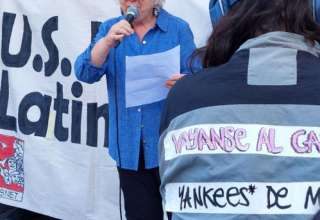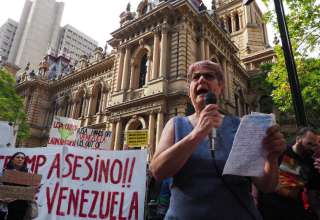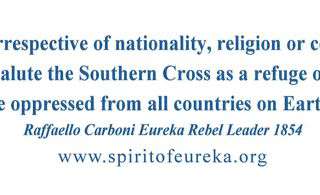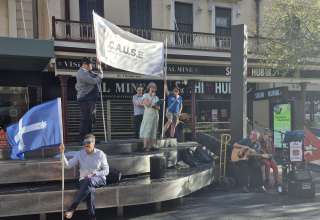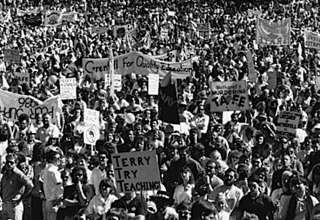By Bevan Ramsden*
There is significant community, including trade union, opposition to the Labor Government’s embrace of AUKUS and its proposed spend of $368 billion on acquisition of nuclear -powered submarines. That opposition is spreading to the Labor Party’s own rank and file branches. The ALP leadership is undeterred by this opposition and one must ask why? Does fear of USA intervention if they deviate from US foreign policy explain their dogged commitment to these policies?
The Albanese ALP government’s embrace of AUKUS and a $368 billion spend on nuclear powered submarines, both policies of the previous Liberal-Coalition government, surprised some and angered many. That anger has spread from community groups, peace organisations, academics and trade unions to the grass-roots of the Labor Party itself. A grass-roots “Labor against War” organization has emerged in NSW making the following statement:” LAW is a grassroots network of ALP members and unionists opposed to Australia being dragged into another US-led war. We oppose involvement in the AUKUS alliance and the acquisition of nuclear submarines. AUKUS is against the interests of the Australian people. The Australian Labor Party and Australian unions have long opposed Australia’s involvement with the nuclear industry and in wars of aggression. We will not be dragged into a war against China.” Resolutions opposing AUKUS and the acquisition of nuclear submarines have been passed by a number of ALP branches and the 2023 Queensland Labor Party Conference adopted the following motion:” ’The Queensland Labor Party categorically opposes the manufacture/construction of nuclear-powered/armed submarines or vessels in Queensland, including but not limited to Brisbane or any other Queensland port current or future port facility. This opposition is based on concerns over safety, environmental impact, and public sentiment”.
One has to ask why the ALP leadership are so adamant, so willing to ignore rank and file and community opinion, and so determined to follow the Liberal Coalition supporting Australia’s commitment to AUKUS and spending $368 billion on nuclear propelled submarines. And indeed why are they are in general subservient to US foreign policy. Why?
One has to consider if the same reason, the same motivation, underpins the Albanese ALP government unwillingness to rescue and free a jailed Australian citizen, Julian Assange who has not been convicted of any crime and is being held in a maximum security UK jail pending a decision on his extradition to the United States,
There is one answer that tends to explain all. Labor leadership wants at all costs for its ALP government to stay in office for as long as possible and are fearful that deviation from US foreign policy and the role it expects Australia to play in its implementation may bring political and economic de-stabilisation which would bring the Labor Government down.
The ALP leadership is only too aware of the political and economic de-stabilisation by the United States in 1972-75 which resulted in the dismissal of the democratically elected Whitlam Labor government.
That there was such US interference in Australian domestic politics by the United States in 1975 is not in doubt. It is recorded in Hansard, that Gough Whitlam made a statement to Parliament in 1977 in which he said:’ “I never met President Carter but I had a significant meeting with his Assistant Secretary of State for Asia and South Pacific, Warren Christopher. On Wednesday, 27th July, 1977 at 8 am, Alston had arranged a breakfast meeting in the Qantas VIP room at Sydney Airport. Those present were Alston, Christopher, his Aide, my Aide Richard Butler and I.”
Whitlam continues speaking of Warren Christopher:
“He made it clear to us that he had made a special detour in his itinerary for the purpose of speaking to me. The President had asked him to say: That he understood the Democratic Party and the ALP were fraternal parties. That he respected deeply the democratic rights of allies of the US
I ask the honourable members of Parliament to note what he says next:
That the US administration would never AGAIN – I repeat those words: Would never AGAIN interfere in the domestic political processes in Australia; and
That he would work with whatever government the people of Australia elected….”
White House displeasure with the ALP went back to their condemnation of the US carpet bombing of Hanoi, before they formed an elected government in 1972.
But the US interference began after Whitlam demanded to know if and why the CIA was running a spy base at Pine Gap near Alice Springs, a giant “vacuum cleaner” which, as Edward Snowden revealed , allows the US to spy on everyone. Snowden also revealed that in the minutes of a meeting with the US Ambassador. Mr Whitlam warned “Try and screw us or bounce us and Pine gap will become a matter of contention”.
Victor Marchetti, the CIA officer who helped set up Pine Gap, told me, says journalist John Pilger, “The threat to close Pine gap caused apoplexy in the White House…. and a kind of Chilean Coup was set in motion.”
Joan Coxsedge in an article on Nugan Hand and the CIA and ousting of the Whitlam government states: “There was, however, no statement of intent from Whitlam that his government intended to close Pine Gap. The Pine Gap Treaty was signed on December, 1966 for an initial 9 years and either party could terminate the Treaty thereafter by giving one year’s notice. The critical date for continuing or giving notice was 9th December 1975. Whitlam had stated his government’s policy on foreign military bases in Parliament on 3rd April,1974 and it is recorded in Hansard as follows: ‘The Australian Government takes the attitude that there should not be foreign military bases, stations, installations in Australia. We honour agreements covering existing stations. We do not favour the extension or prolongation of any of those existing ones’.
On December, 9th 1975, Whitlam would have been empowered to act on Pine Gap, but didn’t get the chance as he was sacked a month earlier. “
On 6th November,1975, the head of the Dep’t of Defence reportedly met with the Governor General, Sir John Kerr, and afterwards declared publically, “This is the greatest risk to the nation’s security there has ever been”. (Ref: Coxsedge, Coldicutt & Harant: “Rooted in Secrecy”, 1982. p35)
According to the Australian Financial Review, 28th April,1977, on the 8th November,1975 another senior defence official held a meeting with Governor General Kerr in which he was briefed about the allegations from the CIA that Whitlam was jeopardising the security of American Bases in Australia.
According to the Australian Financial Review, 28th April, 1977, on 8th November, 1975, the CIA in Washington informed the ASIO station chief that all intelligence links with Australia would be cut unless a satisfactory explanation was given about Mr Whitlam’s behaviour
On 10th November, 1975 Whitlam was shown a top-secret message sent from ASIO’s office in Washington and sourced to Theodore Shackley, the notorious head of the CIA’s East Asia division, who had helped run the coup against Salvador Allende in Chile two years earlier. The message
said” The prime minister of Australia was a security risk in his own country.
On 11th November, the day Whitlam was to inform parliament about the secret CIA presence in Australia, he was summoned by Kerr who invoked the little known “reserve powers” to sack the democratically elected Prime Minister and government. The “Whitlam problem” was solved and Australian politics never recovered nor the nation its true independence.
Does this fear of a recurrence of US intervention in Australia’s domestic politics underpin the motivation behind PM Albanese and his parliamentary leaders’ enthusiastic acceptance of AUKUS, their commitment of $368 billion to nuclear submarines and their continuing subservience to US foreign policy?
*Bevan Ramsden is an former telecommunications engineer and TAFE teacher and a long-time peace activist and advocates for Australia’s independence. He is a former member of the coordinating committee of the Independent and Peaceful Australia Network) IPAN) and current editor of its monthly e-publication, Voice.


